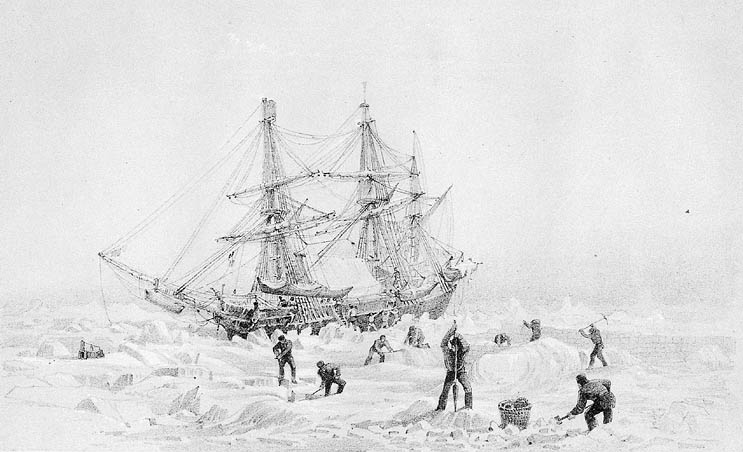<Back to Index>
- Explorer Admiral George Back, 1796
- Sculptor Mikhail Ivanovich Kozlovsky, 1753
- Commander in Chief of the Russian Armies Grand Duke Nikolay Nikolayevich Romanov, 1856
PAGE SPONSOR


Admiral Sir George Back FRS (6 November 1796 – 23 June 1878) was a British naval officer, explorer of the Canadian Arctic, naturalist and artist.
Back was born in Stockport. As a boy, he went to sea as a volunteer in the frigate HMS Arethusa in 1808 and took part in the destruction of batteries on the Spanish coast. In the following year, he was involved in fightings in the Bay of Biscay, until he was captured by the French. Back remained a prisoner until the peace of early 1814 and during this time, practised his skills as an artist, which he later put to use in recording his travels through the Arctic.
Following his release, Back served on HMS Akbar and HMS Bulwark as a midshipman before volunteering to serve under John Franklin in his first expedition to the Arctic in 1818. Back also served under Franklin in his two overland expeditions to survey the northern coast of North America, first on the Coppermine Expedition of 1819 – 1822 and then a similar expedition by the MacKenzie River in 1824 - 1826, during which time he was promoted first to lieutenant and then to commander. Back led his own expedition in 1834 to complete the survey and explore what was later called the Back River in his honor. Richard King, M.R.C.S, was the ship's naturalist and surgeon and contributed appendices on meteorology and botany to Back's account of the expedition; he also wrote his own two - volume account of the expedition.
In 1836, Back was promoted to captain and given command of HMS Terror for an expedition to the northern part of Hudson Bay, with plans to cross the Melville Peninsula overland and explore the opposite shore. Terror was beset in the ice for 10 months and at one point was pushed 40 feet up the side of a cliff by the pressure of the ice. In the spring of 1837, an encounter with an iceberg further damaged the ship, which was in a sinking condition by the time Back was able to beach the ship on the coast of Ireland at Lough Swilly.
Poor health caused Back to retire from active service. He was made a Knight Bachelor on 18 March 1839, and maintained an interest in Arctic exploration for the rest of his life. In 1859, he was nominated a rear - admiral. Back served as an advisor to the Admiralty during the search for John Franklin's lost expedition, and as vice - president of the Royal Geographical Society, having received its gold and silver medal. He was promoted to vice - admiral in 1863 and finally admiral in 1876.
In spite of the high regard in which he was held in Great Britain and the many honors he received, Back had a history of being disliked and distrusted by many of the people he worked with in the Arctic, including Franklin. He was variously criticized for being rude, a weak leader, selfish, sycophantic, and quarrelsome. Later in life he gained a reputation for being a dandy and a womaniser. In 1846, he married the widow of Anthony Hammond.